31 start with W start with W
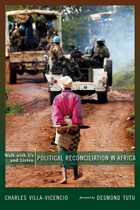
Effective peace agreements are rarely accomplished by idealists. The process of moving from situations of entrenched oppression, armed conflict, open warfare, and mass atrocities toward peace and reconciliation requires a series of small steps and compromises to open the way for the kind of dialogue and negotiation that make political stability, the beginning of democracy, and the rule of law a possibility.
For over forty years, Charles Villa-Vicencio has been on the front lines of Africa's battle for racial equality. In Walk with Us and Listen, he argues that reconciliation needs honest talk to promote trust building and enable former enemies and adversaries to explore joint solutions to the cause of their conflicts. He offers a critical assessment of the South African experiment in transitional justice as captured in the Truth and Reconciliation Commission and considers the influence of ubuntu, in which individuals are defined by their relationships, and other traditional African models of reconciliation. Political reconciliation is offered as a cautious model against which transitional politics needs to be measured. Villa-Vicencio challenges those who stress the obligation to prosecute those allegedly guilty of gross violation of human rights, replacing this call with the need for more complementarity between the International Criminal Court and African mechanisms to achieve the greater goals of justice and peace building.

In this original and provocative book, Nahed Artoul Zehr explores the theological underpinnings of al-Qaeda and related Islamic movements such as ISIS. She demonstrates how this marginal narrative transformed al-Qaeda from a relatively hierarchical and regional organization to a globalized, decentralized, and diffuse system of networks. She draws connections between religious ideas and strategy in her translation and analysis of leading theoretical and tactical jihad text, The Global Islamic Resistance Call, by Mustafa abu Mus’ ab al-Suri.
Just as importantly, she questions al-Qaeda’s understanding of the Islamic tradition on the use of force, arguing that it reflects a weak understanding of this tradition. More specifically, it is al-Qaeda’s (and related groups’) break with this tradition that is key to an al-Qaeda defeat.
Simultaneously, Zehr critiques the US military and policy establishment as it attempts to offer counter-narratives to the al-Qaeda phenomenon that emphasizes “good Muslims” versus “bad Muslims” in order to embrace a “moderate” form of Islam. According to Zehr, this approach is misguided: it is beyond the US government’s purview and expertise to make such theological claims about Islam. Better, she argues, to note the counter-narratives that are coming from within the Muslim community and other nongovernment institutions interested in moving this work forward.
By refocusing our attention on al-Qaeda’s narrative and the various ways thatit is being contested, the book provides an alternate lens from which to viewal-Qaeda and the al-Qaeda phenomenon for Islamic and US foreign policy scholars and students.

This volume examines the limits Islam, Judaism, and Christianity have set for the use of coercive violence. It probes the agreements and disagreements of these major religious traditions on pacifism (the abjurance of all force) and quietism (the avoidance of force unless certain stringent conditions are met).
The distinguished contributors examine the foundations for nonviolence in each religion, criticize the positions each religion has taken, address the inherent challenges nonviolence poses, and evaluate the difficulty of practicing nonviolence in a secular society. The concluding essay defines the common ground, isolates the points of conflict, and suggests avenues of further inquiry.
The most important contribution this volume makes is to demonstrate that no Western religious tradition provides a basis for the glorification of violence. Rather, each accepts warfare as a regretted necessity and sets strict limits on the use of force.
This work offers new insights for those interested in the ethics of warfare, peace studies, religious traditions, and international affairs.

Success in war ultimately depends on the consolidation of political order. Nadia Schadlow argues that the steps needed to consolidate a new political order are not separate from war. They are instead an essential component of war and victory.
The challenge of governance operations did not start with the wars in Iraq and Afghanistan. The US Army’s involvement in the political and economic reconstruction of states has been central to all its armed conflicts from large-scale conventional wars to so-called irregular or counterinsurgency wars. Yet, US policymakers and military leaders have failed to institutionalize lessons on how to consolidate combat gains into desired political outcomes. War and the Art of Governance examines fifteen historical cases of US Army military interventions, from the Mexican War through the wars in Iraq and Afghanistan. Improving future outcomes will require US policymakers and military leaders to accept that plans, timelines, and resources must be shaped to reflect this reality before they intervene in a conflict, not after things go wrong.
Schadlow provides clear lessons for students and scholars of security studies and military history, as well as for policymakers and the military personnel who will be involved in the next foreign intervention.

This book is the first to analyze the institutions, successes, and failures of the People's Democratic Party of Afghanistan, the pro-Soviet regime that sought to dominate the country during the years of the Soviet military presence. Antonio Giustozzi explores the military, political, and social strategies of the predominantly urban and Marxist regime as it struggled—and ultimately failed—to win the support of a largely rural and Islamic population.
Drawing on many Soviet materials not previously used by Western writers, including unpublished Red Army documents and interviews with participants, Giustozzi provides valuable new insights into the cold war and the rise of Islamic revolt.
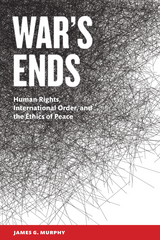
Before military action, and even before mobilization, the decision on whether to go to war is debated by politicians, pundits, and the public. As they address the right or wrong of such action, it is also a time when, in the language of the just war tradition, the wise would deeply investigate their true claim to jus ad bellum (“the right of war”). Wars have negative consequences, not the least impinging on human life, and offer infrequent and uncertain benefits, yet war is part of the human condition.
James G. Murphy’s insightful analysis of the jus ad bellum criteria—competent authority, just cause, right intention, probability of success, last resort, and proportionality—is grounded in a variety of contemporary examples from World War I through Vietnam, the "soccer war" between Honduras and El Salvador, Afghanistan, and the Middle East conflict. Murphy argues persuasively that understanding jus ad bellum requires a primary focus on the international common good and the good of peace. Only secondarily should the argument about going to war hinge on the right of self-defense; in fact, pursuing the common good requires political action, given that peace is not simply the absence of violence. He moves on to demonstrate the interconnectedness of the jus ad bellum criteria, contending that some criteria depend logically on others—and that competent authority, not just cause, is ultimately the most significant criterion in an analysis of going to war. This timely study will be of special interest to scholars and students in ethics, war and peace, and international affairs.

Reports of sexual violence in armed conflict frequently appear in political discussions and news media, presenting a stark contrast to a long history of silence and nonrecognition. Conflict-related sexual violence has transitioned rapidly from a neglected human rights issue to an unambiguous security concern on the agendas of powerful states and the United Nations Security Council. Through interviews and primary-source evidence, Kerry F. Crawford investigates the reasons for this dramatic change and the implications of the securitization of sexual violence.
Views about wartime sexual violence began changing in the 1990s as a result of the conflicts in the former Yugoslavia and Rwanda and then accelerated in the 2000s. Three case studies—the United States' response to sexual violence in the Democratic Republic of Congo, the adoption of UN Security Council Resolution 1820 in 2008, and the development of the United Kingdom’s Preventing Sexual Violence in Conflict Initiative—illustrate that use of the weapon of war frame does not represent pure co-optation by the security sector. Rather, well-placed advocates have used this frame to advance the antisexual violence agenda while simultaneously working to move beyond the frame’s constraints. This book is a groundbreaking account of the transformation of international efforts to end wartime sexual violence.

Winner of the Asia Society's Bernard Schwartz 2012 Book Award
The battles of yesterday were fought over land. Those of today are over energy. But the battles of tomorrow may be over water. Nowhere is that danger greater than in water-distressed Asia.
Water stress is set to become Asia’s defining crisis of the twenty-first century, creating obstacles to continued rapid economic growth, stoking interstate tensions over shared resources, exacerbating long-time territorial disputes, and imposing further hardships on the poor. Asia is home to many of the world's great rivers and lakes, but its huge population and exploding economic and agricultural demand for water make it the most water-scarce continent on a per capita basis. Many of Asia’s water sources cross national boundaries, and as less and less water is available, international tensions will rise. The potential for conflict is further underscored by China’s unrivaled global status as the source of transboundary river flows to the largest number of countries, ranging from India and Vietnam to Russia and Kazakhstan; yet a fast-rising China has declined to enter into water-sharing or cooperative treaties with these states, even as it taps the resources of international rivers.
Water: Asia’s New Battleground is a pioneering study of Asia’s murky water politics and the relationships between fresh water, peace, and security. In this unique and highly readable book, Brahma Chellaney expertly paints a larger picture of water across Asia, highlights the security implications of resource-linked territorial disputes, and proposes real strategies to avoid conflict and more equitably share Asia’s water resources.

This book can best be described as an extended meditation on suffering, phenomenological in method and dialectical in point of view. The angle the author takes is that of moral self-examination rather that conventional scholarly inquiry, and his aim is to think through and evaluate a fundamental claim of our culture, from Aeschylus to Solzhenitsyn, that suffering is the greatest spiritual teacher.
To bring the argument closer to home, Professor Miller focuses on the experience of crisis as the undermining of our attempts, at all costs, to keep control of our lives. This leads him to discuss topics such as the nature of vulnerability, the difference—as sketched by Heidegger—between ordinary fear and metaphysical dread, the ordinary avoidance of suffering, and the heroic willingness to embrace it exemplified by Nietzsche's Thus Spake Zarathustra.
But this is a philosophical essay, not a historical monograph, and Miller's goal is to lead the reader ever deeper in to the heart of crisis where all our illusions about control are stripped away and we forced to face, like Oedipus, the harshest reality of all: that even our existence is not something we can claim as our own. It is here, and only here, Miller claims, the issue of religious conversion can be and must be seriously faced.
This is a demanding book, as exhilarating as it is relentless in its unmasking of the evasions and duplicities with which we shore up our day-to-day lives. The late William F. Lynch, SJ, author of Christ and Apollo, called it "a profoundly moral study of man." To read it is to risk changing your life.

In a deeply unequal world, our economic status shapes our pursuit of virtue whether we have enough resources to live comfortably or struggle to survive
Our understanding of inequality as a moral problem is incomplete. It is not enough to say that inequality is caused by moral failing. We must also see that influence runs in both directions. Inequality harms people’s moral development.
In Wealth, Virtue, and Moral Luck, Kate Ward addresses the issue of inequality from the perspective of Christian virtue ethics, arguing that moral luck—our individual life circumstances—affects our ability to pursue virtue. Economic status functions as moral luck and impedes the ability of both the wealthy and the poor to pursue virtues such as prudence, justice, and temperance, and extreme inequality exacerbates the impact of wealth and poverty on virtue.
With these realities in mind, Ward shows how Christians and Christian communities should respond to the challenges inequality poses to virtue. Through working to change the structures that perpetuate extreme inequality—and through spiritual practices, including contentment, conversion, encountering others, and reminding ourselves of our ultimate dependence on God—Ward believes that we can create a world where all people can pursue and achieve virtue.

Now that responsibility for welfare policy has devolved from Washington to the states, Pamela Winston examines how the welfare policymaking process has changed. Under the welfare reform act of 1996, welfare was the first and most basic safety net program to be sent back to state control. Will the shift help or further diminish programs for low-income people, especially the millions of children who comprise the majority of the poor in the United States?
In this book, Winston probes the nature of state welfare politics under devolution and contrasts it with welfare politics on the national level. Starting with James Madison's argument that the range of perspectives and interests found in state policymaking will be considerably narrower than in Washington, she analyzes the influence of interest groups and other key actors in the legislative process at both the state and national levels. She compares the legislative process during the 104th Congress (1995-96) with that in three states — Maryland, Texas, and North Dakota — and finds that the debates in the states saw a more limited range of participants, with fewer of them representing poor people, and fewer competing ideas.
The welfare reform bill of 1996 comes up for renewal in 2002. At stake in the U.S. experiment in welfare reform are principles of equal opportunity, fairness, and self-determination as well as long-term concerns for political and social stability. This investigation of the implications of the changing pattern of welfare politics will interest scholars and teachers of social policy, federalism, state politics, and public policy generally, and general readers interested in social policy, state politics, social justice, and American politics.

A provocative call to rethink America's values in health care.

Regardless of the fate of national health care reform, public policy makers will have to make difficult and tragic choices about which health services are more or less important. This volume, the first comprehensive examination of setting mental health services priorities, systematically explores the history, ethics, and politics of setting priorities for public mental health services. Because mental health services have traditionally been given lower priority and less generous benefits than general health services, they form a striking case study for priority setting.
Written by mental health care practitioners and scholars, What Price Mental Health? explores the social factors that most influence attempts to set priorities; offers case studies at the state level; illustrates priorities at the federal level and in the private sector; and identifies the ethical criteria that must be applied in any attempt to set priorities.
This volume is conceptionally rich for those familiar with mental health care research, but written in a style understandable to the general reader. Policy makers will find the book useful in the on-going debates about mental health care. Psychologists, public health professionals, researchers and students of psychology, public policy and public health will find this study an absorbing and informative addition to the mental health field.
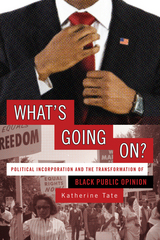
In political opinion surveys from the 1950s through the 1970s, African Americans were consistently among the most liberal groups in the United States and were much further to the left than White Americans on most issues. Starting in the 1980s, Black public opinion began to move to the center, and this trend has deepened since. Why is this the case?
Katherine Tate contends that Black political incorporation and increased affluence since the civil rights movement have made Black politics and public opinion more moderate over time. Black leaders now have greater opportunity to participate in mainstream politics, and Blacks look to elected officials rather than activists for political leadership. Black socioeconomic concerns have moved to the center as poverty has declined and their economic opportunities have improved.
Based on solid analysis of public opinion data from the 1970s to the present, Tate examines how Black opinions on welfare, affirmative action, crime control, school vouchers, civil rights for other minorities, immigration, the environment, and U.S. foreign policy have changed.

Does state acquisition of nuclear weapons lead to stability and peace or instability and crises? This is one of the great debates in international relations scholarship. Michael D. Cohen argues that nuclear weapons acquisition often does dangerously embolden the acquiring state to undertake coercion and aggression, but that this behavior moderates over time as leaders learn the dangers and limitations of nuclear coercion. This book examines the historical cases of the Soviet Union and Pakistan in depth and also looks at mini-cases involving the United States, China, and India. This book broadens our understanding of how leaders and states behave when they acquire nuclear weapons and is important reading for scholars and students of international relations, security studies, and political psychology.

Catholic institutions of higher learning are at a crossroads: How can they remain true to their roots while recognizing that many of their administrations, faculties, and student bodies have little connection with the tradition? How can these institutions remain competitive while maintaining a relationship to the Church?
During the past several years Catholic theologian John C. Haughey, SJ, has conducted groundbreaking research on these questions. He has done this in tandem with a team of Catholic scholars from around the United States. Haughey has also conducted numerous workshops with faculty at a dozen Catholic colleges and universities to learn firsthand about their research and teaching aspirations. Those relationships and conversations provide the foundation for this book’s many insights.
In Where Is Knowing Going? Haughey explores what constitutes the Catholic identity of Catholic colleges and universities. Going beyond a doctrinal understanding of Catholic identity to one that engages and is engaged by the intellectual tradition of Catholicism, Haughey does not find that the issue of Catholic identity is adequately dealt with by marketing the distinctive identities of institutions in terms of their founding religious orders or saints. He provides a sure-handed process whereby the pursuits of individual faculty can be better aligned with the formal mission of the institution.

Just what is a human being? Who counts? The answers to these questions are crucial when one is faced with the ethical issue of taking human life. In this affirmation of the intrinsic personal dignity and inviolability of every human individual, John Kavanaugh, S. J., denies that it can ever be moral to intentionally kill another.
Today in every corner of the world men and women are willing to kill others in the name of "realism" and under the guise of race, class, quality of life, sex, property, nationalism, security, or religion. We justify these killings by either excluding certain humans from our definition of personhood or by invoking a greater good or more pressing value.
Kavanaugh contends that neither alternative is acceptable. He formulates an ethics that opposes the intentional killing not only of medically "marginal" humans but also of depersonalized or criminalized enemies. Offering a philosophy of the person that embraces the undeveloped, the wounded, and the dying, he proposes ways to recover a personal ethical stance in a global society that increasingly devalues the individual.
Kavanaugh discusses the work of a range of philosophers, artists, and activists from Richard Rorty and Søren Kierkegaard to Albert Camus and Woody Allen, from Mother Teresa to Jack Kevorkian. His approach is in stark contrast to that of writer Peter Singer and others who believe that not all human life has intrinsic moral worth. It will challenge philosophers, students of ethics, and anyone concerned about the depersonalization of contemporary life.

In this new volume, two lawyers debate which kind of automobile insurance is the best, no-fault or tort liability. This book presents in one place all the legal, political, historical, and financial arguments about the two types of auto insurance.
Under the fault system currently used by thirty-seven states, tort law provides that the party at fault in the accident pays the full damages of accident victims. Jerry J. Phillips favors this system, arguing that it allows for fair compensation to the injured and deters drivers from dangerous behavior on the road.
Stephen Chippendale counters this claim with the argument that tort-law based insurance combines high cost and low benefits, and that those who truly profit from it are the lawyers representing injured clients, while their claims clog up the court system. A better solution, he proposes, would be "Auto Choice," a plan under which consumers would choose whether or not they wished to be eligible for damages from pain and suffering.
With civility and respect, these two legal scholars present thoughtful and thorough arguments on both sides of the debate, giving readers a balanced view of an issue that affects nearly every American. It will be of particular value to those in the fields of law, policy, and insurance.
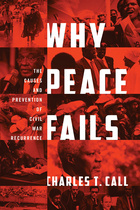
Why does peace fail? More precisely, why do some countries that show every sign of having successfully emerged from civil war fall once again into armed conflict? What explains why peace "sticks" after some wars but not others?
In this illuminating study, Charles T. Call examines the factors behind fifteen cases of civil war recurrence in Africa, Asia, the Caucasus, and Latin America. He argues that widely touted explanations of civil war—such as poverty, conflict over natural resources, and weak states—are far less important than political exclusion. Call’s study shows that inclusion of former opponents in postwar governance plays a decisive role in sustained peace.
Why Peace Fails ultimately suggests that the international community should resist the temptation to prematurely withdraw resources and peacekeepers after a transition from war. Instead, international actors must remain fully engaged with postwar elected governments, ensuring that they make room for former enemies.

By exploring a practical, rather than propositional, understanding of religious belief, this book provides a new construct through which to view philosophy of religion. Terrence W. Tilley shifts the focus of debate from the justification of rational belief to the exercise of wisdom in making or maintaining a commitment to religious practices. It is through practices, Tilley concludes, that religious belief is formed.
After analyzing the strengths and limitations of the modern approaches, Tilley applies the concept of wisdom to the process of making a religious commitment. Wisdom, as explored by Aristotle, St. Thomas Aquinas, and John Henry Newman, may be thought of as the bridge between intellectual and moral virtues. Roughly, it can be described as the ability to put intellect into action in a context. Because wisdom is a virtue requiring concrete display, the book discusses the wisdom of commitment to specific religious practices of a range of traditions. These examples demonstrate the issues and complexities involved in the wisdom of making a religious commitment. This important challenge to contemporary philosophy of religion will be of special interest to students and teachers of theology and philosophy of religion.

Women and Gender Perspectives in the Military compares the integration of women, gender perspectives, and the women, peace, and security agenda into the armed forces of eight countries plus NATO and United Nations peacekeeping operations. This book brings a much-needed crossnational analysis of how militaries have or have not improved gender balance, what has worked and what has not, and who have been the agents for change.
The country cases examined are Sweden, the Netherlands, Canada, the United States, the United Kingdom, Israel, Australia, and South Africa. Despite increased opportunities for women in the militaries of many countries and wider recognition of the value of including gender perspectives to enhance operational effectiveness, progress has encountered roadblocks even nearly twenty years after United Nations Security Council Resolution 1325 kicked off the women, peace, and security agenda. Robert Egnell, Mayesha Alam, and the contributors to this volume conclude that there is no single model for change that can be applied to every country, but the comparative findings reveal many policy-relevant lessons while advancing scholarship about women and gendered perspectives in the military.

Women have been actively involved the United States military for more than fifty years, but the ban on their participation in combat remains a hotly debated issue. In this provocative book Lorry M. Fenner, an active-duty Air Force intelligence officer, calls for opening all aspects of military service to women. Marie deYoung, a former Army chaplain, argues that keeping women out of combat is in the best interests of both sexes and crucial to the effectiveness of the military as a whole.
Fenner bases her argument for inclusion of women on the idea that democracies require all citizens to compete in public endeavor and share in civic obligation. She contends that, historically, reasons for banning women from combat have been culturally biased. She argues that membership in a combat force should be based on capability judged against appropriate standards. Moreover, she maintains that excluding women hampers the diversity and adaptability that by necessity will characterize the armed forces in the twenty-first century.
In contrast, deYoung declares that the different physical fitness standards for men and women would, in combat, lower morale for both sexes and put women at risk of casualty. Further, she contends that women have neither the physical or emotional strength to endure the overall brutality of the combat experience. She also asserts that calls for lifting the combat ban are politically motivated and are inconsistent with the principles of American democracy and the mission of national defense.
With each author responding to the views of the other, their exchange offers a valuable synthesis of the issues surrounding a longstanding debate among policymakers, military personnel, and scholars of both military history and women’s studies.
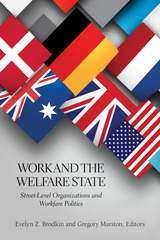
Work and the Welfare State places street-level organizations at the analytic center of welfare-state politics, policy, and management. This volume offers a critical examination of efforts to change the welfare state to a workfare state by looking at on-the-ground issues in six countries: the US, UK, Australia, Denmark, Germany, and the Netherlands.
An international group of scholars contribute organizational studies that shed new light on old debates about policies of workfare and activation. Peeling back the political rhetoric and technical policy jargon, these studies investigate what really goes on in the name of workfare and activation policies and what that means for the poor, unemployed, and marginalized populations subject to these policies. By adopting a street-level approach to welfare state research, Work and the Welfare State reveals the critical, yet largely hidden, role of governance and management reforms in the evolution of the global workfare project. It shows how these reforms have altered organizational arrangements and practices to emphasize workfare’s harsher regulatory features and undermine its potentially enabling ones.
As a major contribution to expanding the conceptualization of how organizations matter to policy and political transformation, this book will be of special interest to all public management and public policy scholars and students.

Working Mandarin for Beginners is designed to enable English-speaking business students and professionals with no prior knowledge of Chinese to develop the basic communication skills necessary for a business trip to China or another work environment in which Mandarin is spoken.
Major features: • Twenty-four lessons, including five review lessons • Clear objectives for acquiring language skills, grammar, and cultural understanding • Lessons cover important basics such as introductions and greetings, counting, reserving a hotel room, taking public transportation, and asking for directions • Lessons cover business tasks such as coordinating and conducting meetings, selling products, and negotiating agreements—all in Chinese • Lessons provide dialogues and vocabulary lists for reading and listening, language points, cultural points, pronunciation drills, grammar, and interactive homework • Course concludes with a special independent project in which the student applies the language to his or her area of business study • Pinyin is used throughout so students can start speaking Mandarin immediately • Includes some basic lessons in the formation of Chinese characters • Course can be combined with affordable online access to self-grading exercises (available through Quia.com, $24.95 per student for 18 months of access)
Student Book • Includes MP3 tracks of dialogues, vocabulary lists, and audio exercises on CD • Lessons are valuable to the classroom student as well as self-directed independent learners
Teacher's Edition • Includes a CD-ROM with all MP3 tracks of dialogues, vocabulary, and audio exercises found on the students' disk • CD-ROM also provides quizzes and exams (including necessary audio), approximately 300 supplementary PowerPoint slides for classroom use, and creative guidance for conversation practice, mini-immersion, and skit
Online teaching features at Quia.com • Instructor-managed class activities and exercises • Monitoring of student progress • Customized grading options online • Students can complete exercises online, submit their answers electronically to their instructor, and receive automatic feedback • Teachers can also use Quia templates to build their own exercises or use exercises developed by other instructors to provide added help for students • Motivated self-directed learners can also access the self-grading online exercises at Quia.com (no instructor feedback will be provided)
SYSTEM REQUIREMENTS
Student's Edition Textbook/MP3 CD (Mac and PC) • CD drive on a computer or conventional CD player with MP3 capability • MP3 player, such as iTunes, RealPlayer, or Windows Media Player • Speakers
Teacher's Edition Textbook/CD-ROM Mac and PC • CD drive on a computer • MP3 player, such as iTunes, RealPlayer, or Windows Media Player • speakers • Adobe Acrobat Reader (available as a free download from http:///www.adobe.com) PC • Windows XP • Microsoft Office 2000 or higher with Service Pack 3 installed (Word and PowerPoint are needed to view and edit some files) • Or, to view the PowerPoints only, download Microsoft PowerPoint Viewer 2003 or higher (free from http://www.microsoft.com) • Fonts for PowerPoints: Arial Unicode and Simsun, which are included in all editions of Office 2000/XP/2003 Mac • Microsoft Word, version Office 2004 or higher • Microsoft PowerPoint, version Office 2004 or higher (Word and PowerPoint are needed to view and edit some files); or view the PowerPoints as PDFs • Fonts for PowerPoints: Arial and Simsun, which are included in Office 2004 and higher
Interactive Exercises on Quia (Mac and PC) • Computer with Internet access, preferably a high-speed connection • Java-enabled browser: Internet Explorer 5 or higher, or any version of Firefox or Safari • The program QuickTime (available as a free download from http://www.quicktime.com) • Microphone to record answers or responses
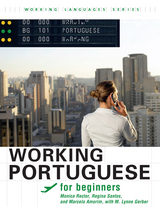
Working Portuguese for Beginners enables English speakers with no prior knowledge of Brazilian Portuguese to develop the basic communication skills and cultural knowledge needed to visit Brazil and to function in a work environment in which Portuguese is spoken. This language program presents not only all the situations and grammar normally covered in an elementary Portuguese textbook but also includes situations set in a business context in every lesson.
Major Features:• Twenty-four lessons, the last four concluding with a special independent project in which the student applies the language to his or her area of professional interest• Clear objectives for acquiring language skills, grammar, and cultural understanding• Lessons cover the important basics normally covered in any beginning Portuguese textbook such as introductions and greetings, counting, making travel plans, taking public transportation, and asking for directions• Lessons cover business tasks such as negotiating a contract, presenting a new product, writing a business memo—all in Brazilian Portuguese• Lessons provide dialogues and vocabulary lists for reading and listening, grammar, cultural reading, and interactive homework• Portuguese-English and English-Portuguese glossaries offer additional help with vocabulary• Course can be combined with affordable online access to self-grading exercises (available through Quia.com, $24.95 per student for 18 months of access)
Student’s Book• Includes MP3 tracks of vocabulary, dialogues, and audio exercises on CD• Lessons are valuable to the classroom student as well as self-directed independent learners
Teacher’s Edition• Includes a CD-ROM with all MP3 tracks of vocabulary, dialogues, and audio exercises found on the student’s disk• CD-ROM also provides quizzes and a midterm, materials for special activities, and approximately 300 supplementary PowerPoint slides for classroom presentation Online teaching features at Quia.com • Instructor-managed class activities and exercises • Monitoring of student progress • Customized grading options online • Students can complete exercises online, submit their answers electronically to their instructor, and receive automatic feedback • Teachers can also use Quia templates to build their own exercises or use exercises developed by other instructors to provide added help for students • Motivated self-directed learners can also access the self-grading online exercises at Quia.com (no instructor feedback will be provided)
SYSTEM REQUIREMENTS
System Requirements for Student's Edition Textbook Disk• Windows 2000 or later or Mac OS 10.2 or later• DVD-ROM drive on a computer or conventional DVD-ROM with MP3 player• Sound card and speakers or earphones for audio• An MP3 player, such as Windows Media Player or iTunes (available as a free download)
System Requirements for Teacher's Edition Textbook DVD-ROM • Windows 2000 or later (including Windows XP, Windows Vista, Windows 7) or Mac OS 10.2 or later (including OS X 10.3, 10.4, 10.5, 10.6)• DVD-ROM drive• Sound card and either speakers or earphones (for MP3 files)• For PCs, Microsoft Word 2000 or later or for Macs, Microsoft Word X or later (for .doc files)• For PCs: PowerPoint 2000 or later (to edit PowerPoint PPT files) or to view PowerPoints only, PowerPoint Viewer 2003 or higher (available as a free download from www.microsoft.com); for Macs: PowerPoint X or later (for PowerPoint files)• An MP3 player, such as Windows Media Player or iTunes (available, respectively, as a free download from www.microsoft.com and www.itunes.com)• For PCs, Adobe Acrobat or Reader 9 or later, or for Macs Adobe Acrobat or Reader 6.0 or later (Adobe Reader is available as a free download from www.adobe.com)
System Requirements for the Online Exercises (Mac and PC)• Computer with Internet access, preferably a high-speed connection• Java-enabled browser: PC: Internet Explorer 6.x or higher, or Firefox 3.x or higherMac: Firefox 3.x or higher, or Safari 3.x or higher• The program QuickTime (available as a free download from http://www.quicktime.com) is needed to play audio• Speakers or headphones to hear audio• Microphone to record answers or responses

Are you looking for a career with professional rewards and personal satisfaction? Perhaps you'd like to find meaningful employment in the field of international relations? Working World is the perfect resource for making sound career choices, and is particularly valuable for those interested in exploring a career in international education, exchange, and development.
Sherry Mueller, president emeritus of a large nonprofit organization with an international focus, and Mark Overmann, a young professional on his way up, serve as spirited guidance counselors and offer valuable insight on launching a career, not just landing a job. The two authors—representing contrasting personalities, levels of experience, and different generations—engage in an entertaining dialogue designed to highlight alternative approaches to the same destination: making a difference in the world. With a rich mix of anecdotes and advice, the two authors present their individual perspectives on career development: identifying your cause, the art of networking, the value of mentors, and careers as "continuous journeys." Mueller and Overmann push job seekers to challenge assumptions about what it means to pursue a career in international relations and to recognize that the path to career success is rarely straight.
To help the job seeker chart the best course, Working World provides specific resources including annotated lists of selected organizations, websites, and further reading. Profiles of twelve professionals, from promising young associates to presidents and CEOs, illustrate the book's main topics. Each professional provides insight into his or her career choices, distills lessons learned, and offers practical advice about building a career in international affairs. All of these resources were chosen specifically to help job seekers map the next steps toward the internship, job, or other opportunity that will give shape to the career they envision.
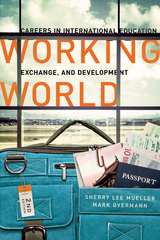
Now available in a new second edition, Working World: Careers in International Education, Exchange, and Development offers an engaging guide for cause-oriented people dedicated to begin or enhance careers in the now burgeoning fields of international affairs. Mueller and Overmann expand their original dialogue between a career veteran and a young professional to address issues that recognize the meteoric rise of social media and dramatic geopolitical events. They explore how the idea of an international career has shifted: nearly every industry taking on more and more international dimensions, while international skills—linguistic ability, intercultural management, and sensitivity—become ever more highly prized by potential employers.
This second edition of Working World offers ten new and four significantly updated profiles as well as new and expanded concepts that include work-life balance, the importance of informational interviews, moving on, and key building blocks for international careers.Like the award-winning first edition, Working World is a rare and valuable resource to students and graduates interested in careers in international affairs, mid-career professionals who want to make a career change or shift, as well as guidance counselors and career center specialists at universities.

On November 10, 2017, Pope Francis became the first pontiff in the nuclear era to take a complete stand against nuclear weapons, even as a form of deterrence. At a Vatican conference of leaders in the field of disarmament, he made it clear that the possession of the bomb itself was immoral. A World Free from Nuclear Weapons presents the pope’s address and original testimony from Nobel Peace Prize laureates, religious leaders, diplomats, and civil society activists.
These luminaries, which include the pope and a Hiroshima survivor, make the moral case against possessing, manufacturing, and deploying nuclear arms. Drew Christiansen, a member of the Holy See delegation to the 2017 United Nations conference that negotiated the Treaty to Prohibit Nuclear Weapons, helps readers to understand this conference in its historical context.
A World Free from Nuclear Weapons is a critical companion for scholars of modern Catholicism, moral theology, and peace studies, as well as policymakers working on effective disarmament. It shows how the Church’s revised position presents an opportunity for global leaders to connect disarmament to larger movements for peace, pointing toward future action.

For much of the developed world, health care for a surging elderly population looms as one of the most daunting problems of the coming decade. In this book, contributors from diverse disciplinary backgrounds and countries discuss resource allocation for the elderly and debate plans for the years ahead. Essays focus on five general issues: the meaning of old age, the goals of medicine and health care for the elderly, the balance between the needs of the young and old, the pressures of other social priorities, and the role of families, especially the burden on women, in long-term care.
In consideration of the difficult moral and practical issues involved, the editors conclude the volume with a special report containing policy recommendations from representatives of eight countries (the United States, Belgium, the Czech Republic, Germany, Hungary, the Netherlands, Sweden, and the United Kingdom). This important volume will be of interest to policymakers and a broad spectrum of health care professionals, as well as to anyone interested in the fate of the elderly or in coming health care challenges.

Organized as a companion volume to Karl Rahner's master work, Foundations of Christian Faith, this book, now again available, also provides the most useful introduction to his theology as a whole. Each chapter presents a broad commentary on the corresponding chapter of Foundations, beginning with Rahner's method and anthropology and concluding with his theology of the church and eschatology. It includes a separate chapter on Rahner's moral thought. Valuable for classroom or individual use, this volume provides questions for discussion, suggestions for further reading, and an extensive glossary of specialized terminology.

Learning to write fluidly in Arabic takes practice. This short workbook helps beginning learners practice each letter in all of its forms by tracing real Arabic words. Learners trace different words across each line to practice letter formation on tracing paper that is bound into the book. The words, handwritten by a native Arabic speaker, show a natural flow and present a model of clean handwriting. Write Arabic Now! can be used independently or alongside a textbook giving beginning learners a proven, effective means of improving their Arabic handwriting.
Along with the workbook, audio of the practice words is also provided. Listening to the words as learners trace the handwriting facilitates acquisition of the Arabic writing and phonetic system, which strengthens reading comprehension skills.
Audio of the words will be freely available on the Georgetown University Press website (press.georgetown.edu) as downloadable MP3s.
READERS
Browse our collection.
PUBLISHERS
See BiblioVault's publisher services.
STUDENT SERVICES
Files for college accessibility offices.
UChicago Accessibility Resources
home | accessibility | search | about | contact us
BiblioVault ® 2001 - 2024
The University of Chicago Press









